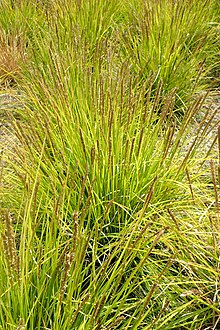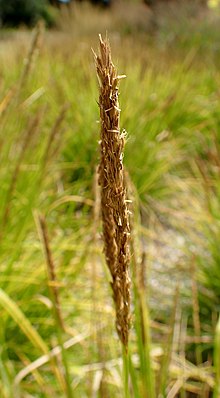Sesleria autumnalis
Sesleria autumnalis, commonly known as autumn moor grass, is a species of grass within the family Poaceae. It is native to southeastern Europe and often used as ornamental ground cover in North America.[6]
| Autumn moor grass | |
|---|---|
 | |
| Scientific classification | |
| Kingdom: | Plantae |
| Clade: | Tracheophytes |
| Clade: | Angiosperms |
| Clade: | Monocots |
| Clade: | Commelinids |
| Order: | Poales |
| Family: | Poaceae |
| Subfamily: | Pooideae |
| Genus: | Sesleria |
| Species: | S. autumnalis |
| Binomial name | |
| Sesleria autumnalis (Scop.) F.W.Schultz 1861[1] | |
| Synonyms | |
Taxonomy
The first recorded description of the species is attributed to Giovanni Antonio Scopoli, who referred to it as Phleum autumnale in the second edition of his book, Flora Carniolica, which was published in 1771. Friedrich Wilhelm Schultz gave the species its current name, Sesleria autumnalis in his book Archives de Flore.[7]
The species has been referred to by several heterotypic synonyms, including: Sesleria elongata, Aira alba, and Sesleria argentea var. elongata.[8]
Description

Sesleria autumnalis is a perennial. Its blades are phyllotactic and overhanging, with v-shaped cross sections. In the autumn it changes in color, from light-green to a yellowish brown. It flowers in late summer, when spikelets grow in groups of three on the end of leafless stems.[9][10]
Distribution and habitat
In its natural habitat, S. autumnalis is often found in wooded regions and grassy or sparsely covered areas.[11] The species is common in the Balkan Peninsula and on the calcite mountains of the eastern Alps.[12]
References
- Schultz, Friedrich Wilhelm. Archives de Flore: journal (recueil) botanique (in French). Volume 1.
- Host, Nicolaus Thomas (1802). Icones et Descriptiones Graminum Austriacorum (in Latin). Volume 2. p. 69.
- Scopoli, Giovanni Antonio. Flora Carniolica (in Italian). Volume 1 (2nd ed.). p. 56.
- Kunth, Karl Sigismund (1835). Distribution méthodique de la famille des Graminées (in Latin). Volume 1. Paris: Librarie-Gide. p. 110.
- Pignatti, Sandro (1982). Flora d'Italia (in Italian). Volume 3. Edagricole. p. 365. ISBN 9788820623128.
- Barkworth, Mary E.; Anderton, Laurel K.; Capels, Kathleen M.; Long, Sandy; Piep, Michael B. (2007). Manual of Grasses for North America. University Press of Colorado. ISBN 9781457180989.
- Deyl, Miloš (1946). Study of the Genus Sesleria. C̆eskoslovenská Botanická Spolec̆nost. p. 94.
- "Sesleria autumnalis Synonyms". World Checklist of Selected Plant Families (WCSP). Royal Botanic Gardens, Kew.
- Greenlee, John (1992). The Encyclopedia of Ornamental Grasses. Rodale Press. pp. 146–147.
- Clayton, W.D.; Vorontsova, M.S.; Harman, K.T.; Williamson, H. (2006-11-08). "Sesleria autumnalis". GrassBase - The Online World Grass Flora. Royal Botanic Gardens, Kew. Retrieved 2020-07-05.
- Nuovo giornale botanico italiano (in Italian). Volume 15. Societa botanica italiana. 1908. p. 317.
- Theurillar, Jean-Paul; Aeschimann, D.;Küpfer, Philippe; Spichiger, R. (1995). "The Higher Vegetation Units of the Alps". Colloq Phytosociol. Volume 23: p. 189-239.